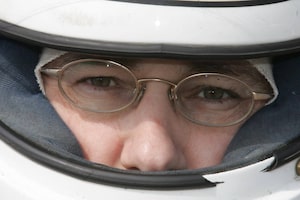Philippe Létourneau, an expert from Canada’s Worst Driver, with a student driver.Michel Fyen-Gagnon
As a driving instructor who moonlights as a television expert on Canada's Worst Driver, Philippe Létourneau knows there will always be a need for his day job.
The guy who tries to help gigantic klutzes find a semblance of driving competency on TV also uses his expert knowledge to teach advanced skills to everyday motorists and budding Canadian racers.
For Létourneau, it's all about helping people develop skills and learn to like driving, rather than seeing it as a simple A to B chore.
"Obviously, if you like driving, then you're a better driver – you're more focused and understand the responsibility," he said.
"When you think about the number of hours you'll spent in a car in your lifetime, you might as well enjoy it."
The 40-year-old acts as chief driving instructor for BMW's Driver Training Program as well as the Jim Russell Racing School.
The first school teaches advanced skills to help Canadians handle their cars better on the road, while the second is more geared towards someone looking to race.
Sadly, Létourneau sees fewer Canadian kids choosing to try racing these days, mostly because they are being priced out of the market.
"We have seen the business change a lot in the last 20 years, and I would say in the last eight that there are not a lot of people getting involved in motorsports," said Létourneau, who was also part of the Star Racer reality show on the Discovery Channel that was cancelled after one season.
"When I started out, I remember I had one kart, one engine, and I was stretching my tires as long as they could go. Now I look at the kids these days, they come to the races with those big trailers, they have dynos, 13 engines, and God knows how many sets of tires, this and that, and I'm thinking, 'wow, that's karting?' It's getting out of hand and I think it doesn't help to produce Canadian drivers; ultimately, there's no pool to pick them from."
The former racer knows good prospects when he sees them, having trained several top Canadians, including reigning Deutsche Tourenwagen Masters champion Bruno Spengler, who now drives for BMW.
While promising racers may be rare, it's not as difficult to find motorists who qualify for Canada's Worst Driver. Now in its ninth season, the Discovery Channel program continues to uncover star candidates every week. Létourneau has been on the show as the expert driver coach and judge since its third season. Létourneau chuckled as he recalled that he once worried that there may not be enough candidates to give the program staying power.
"I thought after the first few years: 'Where are we going to keep finding drivers, really bad drivers,'" he said.
"It's sad to say, but I think we have enough people to make the show last a lifetime. There are so many bad drivers and it's actually scary and that's why I'm glad to be part of a program that's trying to educate people about driving."
He also has personal reasons for being concerned about poor driving, having lost a cousin in a car accident.
A large part of the problem on Canadian roads lies with driver training which puts people on the road with minimal skills and zero pride in their driving, Létourneau insisted. While he believes that driving should be fun, there is also responsibility that goes along with it and "they don't teach that."
"When new drivers go for their license, yes it's important to know the fines and do not enter there and do not merge there," he said.
"I agree with that, which is fine, but they should have a portion of their education about how to behave properly, like understanding how to be a driver sharing the road with others."
While driver training is a good place to start, spending millions of dollars on misguided awareness campaigns that fall completely off the mark really gets under Létourneau's skin. Instead, he insisted, take that money and use it to teach responsibility behind the wheel rather than trying to change driving habits through catchy slogans.
For example, there's a "speed kills" campaign in his home province of Quebec that tries to convince young drivers to slow down – something he believes is doomed to fail before it even starts.
"Let's not try to tell them that 'speed is not fun' because it will never work," he said.
"A bit of knowledge will not make people stupid. We need to educate the kids and tell them 'Hey, listen, let's go have fun,' but have fun with some driving programs in a safe environment and you'll understand and realize that driving on a public road is potentially very, very dangerous."
The key is to get them onto a race track, drifting course, or drag strip where there are no other motorists and proper safety protocols in place. Only there can anyone really see their limitations behind the wheel, understand that there's a time and place for high performance driving, and learn how to deal with emergency situations as they arise.
And much of it goes back to learning how to model your behaviour behind the wheel after a racing driver, while remembering the responsibility everyone shares for safe driving on public roads.
"We teach people stuff that we don't ask them to do on public roads but it builds up confidence, it builds car control, and ultimately we try to create new habits and be prepared in case something goes wrong," he said.
"When you drive, you still have to be focused, you still have to look far ahead, you have to anticipate, it doesn't mean you're racing on public roads, you just have to be alert and be ahead of the game, be prepared for the what ifs."
For more from Jeff Pappone, go to facebook.com/jeffpappone
Twitter: @jpappone
 Jeff Pappone
Jeff Pappone